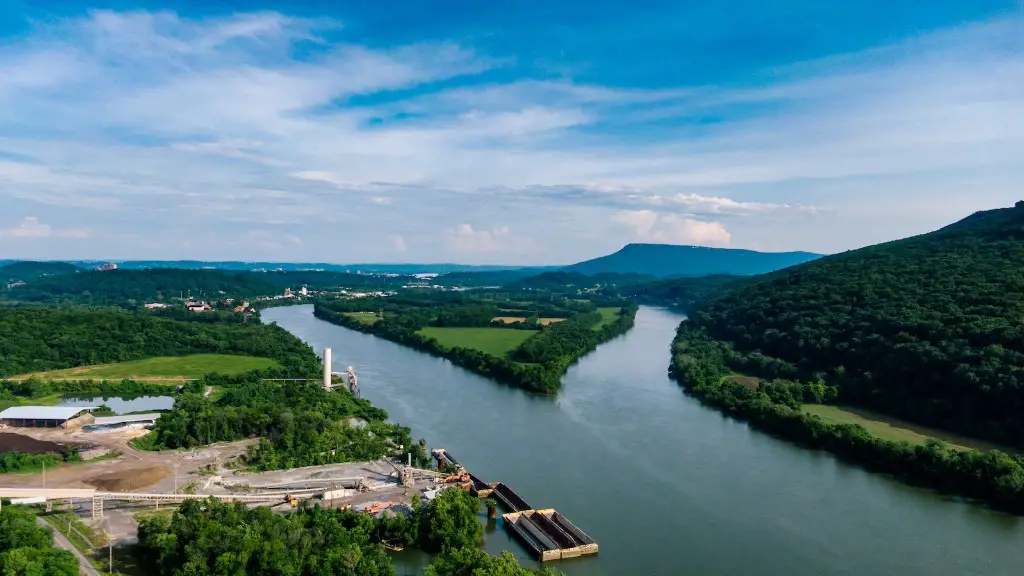Benefits of the Flooding of the Nile River for Egypt
The flooding of the River Nile was an important phenomenon for the development of Ancient Egyptian civilisation and it provided several advantages to the early civilisation in various ways. The rich silt that was deposited every year into the floodplain, meant that the soil in the region became more fertile, providing an abundant source of food. Additionally, the large and varied amount of fish in the river meant fishing became an important and lucrative industry. Finally, the predictable flooding patterns provided the Egyptians with a calendar system to measure the time.
The increased fertility of the soil due to the flooding allowed the Egyptians to have a reliable and constantly replenished food source. This enabled them to farm on a large scale and significantly increased their food stocks. The combination of a healthy and constantly replenished food source and the exchange of goods, meant that the Egyptian people could focus on other occupations such as pottery and crafts, as well as metal technology. This enabled them to develop from a largely subsistence-based and hunter-gatherer culture to an agricultural-based civilisation with bustling cities, further expanding their economy and culture.
The abundance of food was not the only advantage provided by the flooding. The predictable pattern of the flooding enabled the Egyptians to create one of the oldest and most accurate calendars in history. The flooding would happen annually, usually occurring between mid-June and mid-September, prompting the Egyptians to record the exact date. This calendar allowed the Egyptians to measure time and track the progress of their fields throughout the year. For example, they could tell when to prepare the fields, when to seed and when to gather the harvest.
Finally, the flooding of the Nile provided the Egyptians with an ample source of fish, meaning fishing was an important occupational industry. The fishermen reaped a large number of the river’s fish and sold them in the villages along the river. This was a lucrative business and the profits were used to purchase a variety of goods.
Socio-Political Impact of the Nile Flooding
The flooding of the Nile had a major influence on the socio-political development in Ancient Egypt. The rich silt that was deposited each year into the floodplain meant that the soil in the region became more fertile, providing an abundant source of food. This made it possible for the Egyptians to support a large population, which allowed them to develop a strong and powerful government. The government subsequently controlled the distribution of food and goods, as well as the taxes in the country.
Furthermore, the presence of an unknown source of water gave the Egyptians a sense of security and encouraged them to expand their territory. Since the Egyptians were able to control the waters of the Nile and create irrigation systems, they started to conquer neighbouring territories and expand their empire. Consequently, they were able to create a powerful state and build a strong defence system.
Moreover, the constant flooding of the river was a sign of prosperity and a symbol of stability, which consolidated their power and authority. Additionally, it was believed that the Nile was an entrance to the spiritual world, as it was the source of all life for the Egyptians. This belief contributed to their piety, as well as their connection to the divine.
Furthermore, the Egyptians developed many religious rituals and rites that were associated with the Nile. The river became an integral part of the religion of Ancient Egypt, which further cemented its importance and value to the nation.
Environmental Impact of the Flooding
The flooding of the River Nile had a major influence on the environment of Ancient Egyptian civilisation. The flooding of the river replenished the soil and created more fertile land, enabling the Egyptians to have a reliable and constantly replenished food source. This provided the Egyptians with a stable food supply, while also keeping the land fertile and productive.
Additionally, the flooding and the creation of irrigation systems led to the expansion of the arable land. This enabled the Egyptians to grow a variety of crops and plants, such as wheat and barley, which further increased their food supply. Furthermore, the flooding also led to the creation of swamps, which provided a habitat for many aquatic species, giving the Egyptians a continuous source of fish.
Moreover, the flooding of the Nile also increased the amount of water and moisture in the air, leading to the creation of verdant and lush landscapes. This contributed to the aesthetic beauty of the region, which further reinforced their connection to the divine. Furthermore, the presence of the river brought great joy to the people, as they could admire its majestic beauty and appreciate its life-giving waters.
Finally, the flooding created a barrier between Egypt and its neighbours, which dissuaded any potential invasions and strengthened the nation’s defence system.
Conclusion of the Nile Flooding
In conclusion, the predictable pattern of the River Nile flooding provided Ancient Egypt with an abundant and reliable source of food and an accurate calendar system. Additionally, it enabled them to build an empire and it provided them with a unique aesthetic landscape that was admired by many. Furthermore, it established a barrier between Egypt and its neighbours, giving them a sense of security. The flooding was truly a blessing for Ancient Egypt, as it allowed them to develop a strong and prosperous civilisation.
Environmental Consequences of the Nile Flooding
Despite the many benefits of the Nile flooding, it also had several environmental consequences. Firstly, the flooding led to the destruction of vegetation and soil erosion, which had a negative impact on the environment. This meant that the soil was not able to retain the same amount of nutrients, resulting in decreased fertility and productivity. Additionally, the flooding caused increased salinity in the soil, which affected the ability of the plants to uptake essential nutrients.
Furthermore, the flooding also caused an increase in the amount of pests and disease in the region. This was due to the fact that stagnant water created the perfect breeding ground for many harmful insects and parasites. Moreover, the over-irrigation of the land caused waterlogging, which further decreased the fertility of the soil and had detrimental consequences for the environment.
Finally, the flooding of the Nile also caused large-scale flooding, resulting in the displacement of thousands of people and the destruction of their homes and crops. This led to a decrease in the population size and many of these displaced people were unable to return to their original homes.
Implications of the Nile Flooding
The flooding of the Nile has had a major impact on the social, economic, and environmental development of Egypt over the centuries. The flooding provided the Egyptians with a dependable and nourishing food source, as well as an accurate calendar system. It also provided them with a powerful defence system, protected their borders and enabled them to expand their territory. Furthermore, it provided the Egyptians with a beautiful landscape, which was a reflection of their spiritual connection to the divine.
Nonetheless, the consequences of the flooding have been disastrous at times. The flooding led to soil erosion, salinity problems, an increase in pests and disease, as well as large-scale flooding. This had serious repercussions for the environment, as well as for the people who were displaced due to the floods.
For this reason, it is important for us to take steps to ensure that the effects of the Nile flooding are managed and mitigated. We could use new technologies such as flood warning systems, as well as effective agricultural practices, in order to protect our environment, as well as the people who live in the region. By doing so, we can ensure that the flooding of the Nile continues to benefit Egypt, without causing too much harm.




